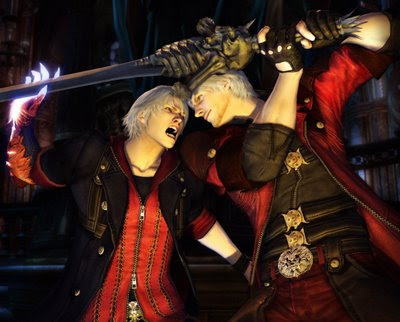
Devil May Cry is a hugely divisive series in videogaming. Many love it for it's old school score-attack mechanics, intricately gothic design, deep and complicated fighting style and outrageous camp, and predictably, many hate it for those exact same reasons. It hasn't helped that the series has been so wildly inconsistent, with the excellent original followed up by an awful sequel and a third game that was so infamously hard it was re-released just to neuter the difficulty. So combined with the shift to new hardware, this fourth game marks something of a rebirth for the series, and oddly enough it does this by ditching one of it's most appealing aspects, it's cocksure antihero Dante, recasting him as the game's antagonist. In his place is a new protagonist named Nero, a younger, more serious and angry character. This shift is mirrored in the general tone of the game, which adopts a far more serious, epic and artistic style than the moody darkness of previous DMC's, with ancient temples and demonic towers replaced by snowbound castles and sun-dappled forests. The visual design is spectacular and when allied to a powerful graphics engine the result is a game which is often stunningly beautiful, both statically and in motion
Nero doesn't just revitalise the look and feel of the game, but it's whole style of play as well. Although his sword 'n' gun attacks are similar to Dante, his moveset is reduced in favour of a new toy, his possessed arm, known as the Devil Bringer. This allows long-range grabs and powerful close quarters throws, meaning combo chains can be kept going for longer and the guard of enemies can be more easily broken. Although it initially feels cheap, with time and the introduction of harder enemies the balance is just right, and combined with the new 'Exceed' system, which allows Nero to rev up his sword for extra damage, it can lead to spectacular chains of attacks in trained hands. By the mid-point of the game, controlling Nero feels instinctive and exciting, with the player effortlessly dishing out huge combos and epic juggles. Which is why it's such a shock when it's all suddenly taken away.
Without wishing to get too spoileriffic, it's fair to say Nero suddenly becomes incapacitated, which means Dante, who up until this point has appeared only as an enemy, suddenly takes over as the main playable character. The stylistic shift is not total, but it takes a good while to get used to. As in DMC3 Dante has four separate styles of fighting, Swordmaster, Gunslinger, Trickster and Royal Guard. Each accentuates a different aspect of combat, and each adds a different set of moves on top of Dante's basic skillset. The net result of this is that Dante has huge variety of moves available to him (and we're not even considering the alternate weapons yet), and combined with his obvious lack of Devil Bringer attacks, he's a much deeper and more difficult character to play as. For a while - quite a long while actually - this irritates as you're forced not just to relearn movesets but to retailor your entire fighting style. But gradually, another feeling emerges - the feeling that the training wheels have been taken off. There's a lot more variety available with Dante, as well as the ability to mix up your styles for more grandstanding kills. Further sweetening the pill is Dante's ludicrous selection of weapons. The undoubted show-stealer is Pandora, a cursed briefcase that transforms into a variety of other forms, such as rocket launchers and laser cannons, and ultimately into a giant floating missile platform that rains spectacular death on nearby enemies.
There remains a lot to criticise about the game, most obviously the terrible environment recycling (Dante's levels are just Nero's levels in reverse) and the archaic backtracking and forced puzzles. And while the bosses are hugely spectacular and great fun to fight, that doesn't quite justify their inclusion three times. The camera is often flawed and can't decide whether it wants to be fixed or player controlled, often copping out and offering a weak mix of the two. Yet despite these totally valid criticisms there's something inherently lovable about the the game. I mentioned near the beginning that this is a more serious, mature Devil May Cry, and that's true, but we are speaking in relative terms here, and you've still got cutscenes filmed by an anime fanboy and dialogue written by a pantomime director. Particularly once Dante enters, the game practically implants its tongue in its cheek, with several scenes in particular raising the bar for hammy dialogue (to those in the know, I'll simply say "I'm here to reclaim what is rightfully mine!").
Overall then, this is a big, brutal, lovable beast of a game. It doesn't claim to be be clever, in fact it often goes out of it's way to prove it isn't, but the core appeal still lies there. Only now, it's smart as well, it's difficulty curve perfectly pitched, it's story touching and interesting as well as funny and silly and it's core gameplay just as challenging and rewarding as it ever was. It isn't perfect, but you'll be having so much fun you won't care
8/10


No comments:
Post a Comment